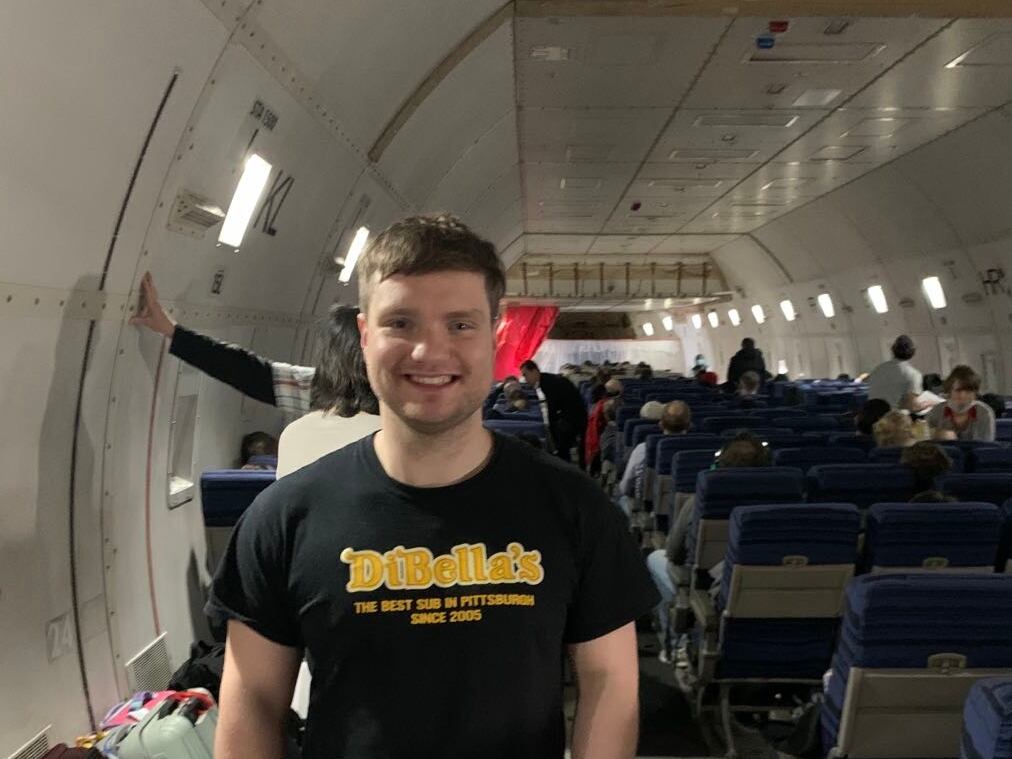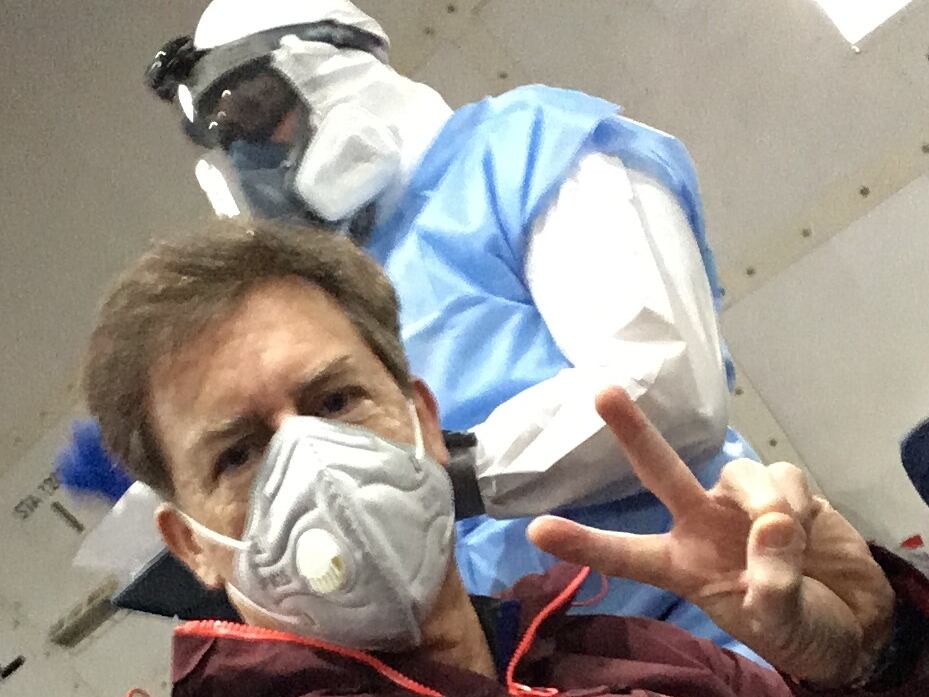What will the first group of Americans in more than 50 years quarantined for a public health concern do when they are released Tuesday from March Air Reserve Base in Southern California?
“We’re going to Disneyland," David Sherman, a former Army AH-64 Apache pilot and one of 195 Americans evacuee who has spent the past 13 days sequestered at a temporary lodging facility at the base, told Military Times by phone. “We’d go right now if these guys would let us jump the fence.”
“In and Out Burger? I’ve heard of it but I’ve never eaten it,” added Daniel Wethli, a Fulbright scholar who was researching the Chinese Revolution of 1911 in Wuhan, China, when a new virus began spreading throughout the city.
Since Jan. 29, Wethli and Sherman have lived alongside nearly 200 other men, women and children on the base in Riverside County, California, fenced off from the world and guarded by law enforcement officers.

They’ve been cleared to head home Tuesday after a two-week quarantine that followed their evacuation from Wuhan ― Ground Zero in China for the novel coronavirus that has now spread to 25 countries.
None were confirmed to have the illness and all are eager to reach their final destinations.
“I’ve bought my ticket back to Pittsburgh,” said Wethli, who had planned to be in China until October.
Sherman said, “I’m going right back to Seattle and back to work. They were expecting me at work on the 2nd of February.”
Wethli had been in China for nearly five months when he started hearing from family and friends in the U.S. about a new illness spreading across the industrial city of Wuhan.
As the number of cases and death toll mounted, the Chinese government ordered Wuhan to be sealed off from the rest of the country and the U.S. State Department, which funds the Fulbright program, told Wethli to get out of there.
“It took about five days for a plan to come together,” Wethli said.
Sherman, a pilot with Alaska Airlines, had flown to Wuhan to visit his fiancée in January, after news of the diseases began trickling out of China. He said he tracked the outbreak on the news, but it was “under-reported at the time.”

"The last report I saw was an interview with a British doctor who said it was basically under control,” so he decided to go, he said, flying into a city under siege.
“[At first], we were still fairly relaxed. But [my fiancee’s] family owns a pharmacy. So from [Jan.] 22nd to the 29th, I pretty much worked at their pharmacy every day because it began getting very busy. Masks, cold medicine, flu medicine and prescriptions," Sherman said.
The evacuees remember the scramble to get tickets on the first flight out and the chaos of not knowing their final destination, which changed from San Francisco to Ontario, California, and ultimately March, "obviously evolving as we went,” Sherman said.
Once at March, they were told they were free to leave after receiving medical screening. Their tests would be sent to the Centers for Disease Control and Prevention in Atlanta, but they could go home and wait for the results.
Soon thereafter, plans changed. Evacuees were asked to stay at March on a volunteer basis for three days and isolate themselves for 11 more days once home.
Then came the chain link fence, increased security and the truck carrying surveillance equipment. A federal quarantine order was issued Jan. 31.
“It became apparent after 24 hours it was not volunteering,” Sherman said. “We were talking outside at night, and I’d consumed quite a bit of water to hydrate and I had to pee, but the bathrooms were full, so I … ducked under a rope and was immediately ‘captured’ by three sheriff’s department officers. Wow."
But the confinement has not been bad, said Sherman and Wethli. The circumstances, which included having their own rooms, access to three meals a day, TV and internet and classes conducted by fellow evacuees like art and fitness, helped cultivate friendships.
“It’s been amazing. There’s a guy here that’s putting on a boxing class and there’s only four of us. I’ve never done boxing so it’s good exercise and something new I get to learn,” Wethli said.
“Most of the folks are mingling all the time, talking to different people and meeting new friends every day and that’s really positive,” Sherman added.
In early February, four more planes carrying evacuees from China arrived in the U.S., bringing roughly 600 more people to Travis Air Force Base near Sacramento, Marine Corps Air Station Miramar in San Diego, Lackland Air Force Base in Texas and Eppley Airfield in Omaha, Nebraska.
Military personnel on the bases are not in direct contact with any evacuees to “minimize contact with personnel supporting the evacuees,” according to the Department of Defense.
While none of the evacuees in Sherman and Wethli’s group were found to have the virus, an evacuee who arrived at Miramar on Wednesday was confirmed to have the virus on Monday, the 13th case of 2019-nCoV in the U.S. The patient is in isolation at UC San Diego Health.
As of Tuesday, the number of novel coronavirus cases worldwide surpassed 43,000, and the death toll has reached 1,018 in China. CDC officials are working to contain the threat to the United States and ask all Americans to practice good health hygiene, which means staying home if you are ill, washing your hands frequently with soap and water or using hand sanitizer if soap is not available, and coughing or sneezing into a tissue or one’s sleeve.
The precautions also will help curb the annual threat of influenza, Dr. Nancy Messonnier, director for the National Center for Immunization and Respiratory Diseases, said Monday.
There have been 24 million flu cases in the U.S. this season and 12,000 deaths, according to Messonnier.

At March, Wethli and Sherman say they look forward to rejoining friends and family and resuming their lives. But they plan to remain in touch with those they’ve met on base and recommend to the new crop of arrivals at the start of their two weeks of quarantine to socialize.
While it might sound counterintuitive, given concerns that fellow evacuees may be carrying the coronavirus, they say, it helped keep them positive.
“I remember being worried that they’re would be a lot of panic, a lot of fear ... because this was not planned, not part of our routine," Wethli said. “But people have been really positive, really great. It’s been an amazing experience to kind of come together unexpectedly.”
Patricia Kime is a senior writer covering military and veterans health care, medicine and personnel issues.




